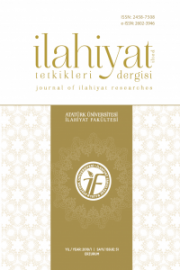Kur’an İlimleri Bağlamında Erken Dönemde Nesh Algısı: Hâris el-Muhâsibî Örneği
The Perception of Naskh in the Context of the Qur’ānic Sciences in the Early Period: The Case of Hāris el-Muhāsibī
Author(s): Hekim TaySubject(s): Islam studies, History of Islam
Published by: Atatürk Üniversitesi İlahiyat Fakültesi
Keywords: Tafsīr; Hāris al-Muhāsibī; Naskh; Mansūkh; Nāsikh;
Summary/Abstract: Naskh is one of the main issues of tafsīr, kalām, and fıqh. Naskh is closely related to the Qur’ān history because of its importance. The Prophet, the companions and the revelation period of verses appear to be determining factors in naskh. In the first centuries, rather than the existence of the naskh, its scope and quality were examined. Undoubtedly, this situation was closely related to the fact that there were not any views that did not accept the existence of naskh in the previous period. The idea that the naskh was not realized in the Qur’ān has emerge and the supporters of this thought increased to a considerable extent in the later period. One of the early period scholars who expressed ideas about the naskh was Hāris al-Muhāsibī (d. 243/857). Muhāsibī, who was known for his asceticism, lived in a period in which faith and fiqh sects emerged and formed. Muhāsibī wrote many works in different areas. In this works, various subject of the Qur’ānic tafsir were discussed. One of the basic subjects being emphasized is naskh. In this study, in general, the problem of naskh and Muhāsibī's naskh understanding will be investigated with various aspects.
Journal: İlahiyat Tetkikleri Dergisi
- Issue Year: 2019
- Issue No: 51
- Page Range: 49-82
- Page Count: 34
- Language: Turkish

